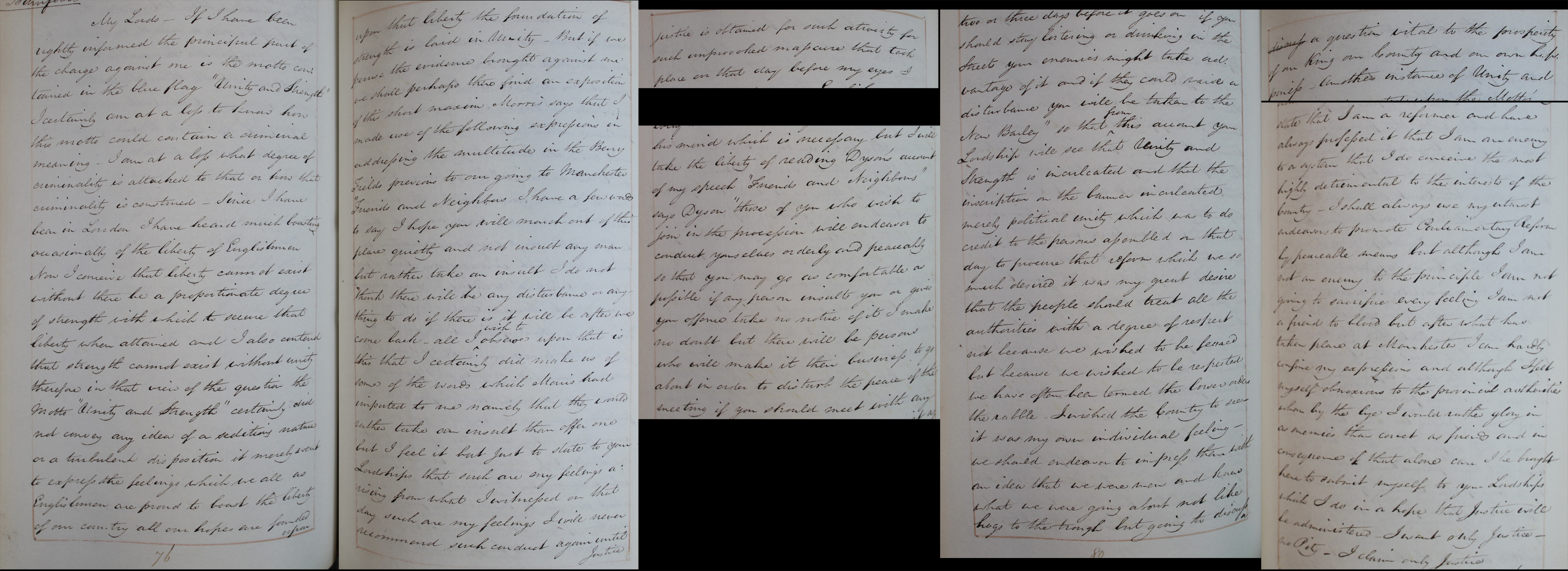
This is an extract from Samuel Bamford’s plea to the judge before he was sentenced. He repeats the radicals’ line that the drilling was intended to keep order, but goes on to express his anger at the slaughter and say he will not recommend non-violence again. This is quite powerful as he will suffer for this challenge. This is a transcript from the trial of Henry Hunt & others for sedition at Manchester on 16 August 1819.
(Catalogue reference TS 36/2)
Transcript
(i)
My Lords – If I have been rightly informed the principal part of the charge against me is the motto contained in the blue flag ‘Unity and Strength’. I am certainly at a loss to know how this motto could contain a criminal meaning. I am at a loss what degree of criminality is attached to that or how that criminality is continued. Since I have been in London I have heard much boasting occasionally of the liberty of Englishmen. Now I conceive that liberty cannot exist without there be a proportionate degree of strength with which to secure that liberty when attained and I also contend that strength cannot exist without unity therefore in that view of the question the motto ‘Unity and Strength’ certainly did not convey any idea of a seditious nature or a turbulent disposition, it merely went to express the feelings which we all as Englishmen are proud to boast: the liberty of our country. All our hopes are founded
(ii)
upon that liberty. The foundation of strength is laid in unity. But if we peruse the evidence brought against me we shall perhaps there find an explanation of that maxim. Morris says that I made use of the following expressions in addressing the multitude in Barrow Fields [Middleton] previous to going to Manchester: ‘Friends and Neighbours I have a few words to relate: you will march off this place quietly, not to insult anyone, but rather take an insult. I do not think there will be any disturbance or any thing to do; if there is it will be after we come back.’ All I wish to observe upon that is that I certainly did make use of some of the words which Morris had imputed to me, namely that they would rather take an insult than offer one. But I feel it but just to state to your Lordships that such are my feelings arising from what I witnessed on that day, such are my feelings I will never recommend such conduct again
(iii)
until justice is obtained for such unprovoked massacre that took place on that day before my eyes.
(iv)
… I will take the Liberty of reading James Dyson’s account of my speech “Friends and Neighbours”, says Dyson “those of you who wish to join in the procession will endeavour to conduct yourselves orderly and peacefully so that you may go as comfortable as possible, if any person insults you or gives you offence take no notice of it. I make no doubt that there will be persons who will make it their business to go about in order to disturb the peace of the meeting…
(v)
… if you would stay loitering or drinking in the streets, your enemies might take advantage of it and if they could raise a disturbance, you would be taken to the New Bayley’. So from this account your Lordship will see that Unity and Strength is inculcated and that the inscription on the banner is inculcated merely political unity, which was to do credit to the persons assembled on that day to procure that reform which we so much desired. It was my great desire that the people should treat all the authorities with a degree of respect, not because we wished to be feared but because we wished to be respected. We have often been termed the lower orders, the rabble. I wished the Country to see it was my own individual feeling. We should endeavour to impress them with an idea that we were men and knew what we were going about, not like hogs to the trough but going to discuss
(vi)
a question vital to the prosperity of our King and Country and our own happiness.
(vii)
… I am a reformer and have always professed it that I am an enemy to a system that I do conceive the most highly detrimental to the interests of the Country. I shall always use my utmost endeavours to promote Parliamentary Reform by peaceful means, but although I am not an enemy to the principle I am not going to sacrifice every feeling. I am not a friend to blood but after what has taken place at Manchester I can hardly confine my expressions and although felt myself obnoxious to the provincial authorities whom by the bye I would rather glory in as enemies than count as friends and in consequence of that alone can I be brought to submit myself to your Lordships which I do in a hope that justice will be administered. I want only Justice – no Pity – I claim only Justice.
